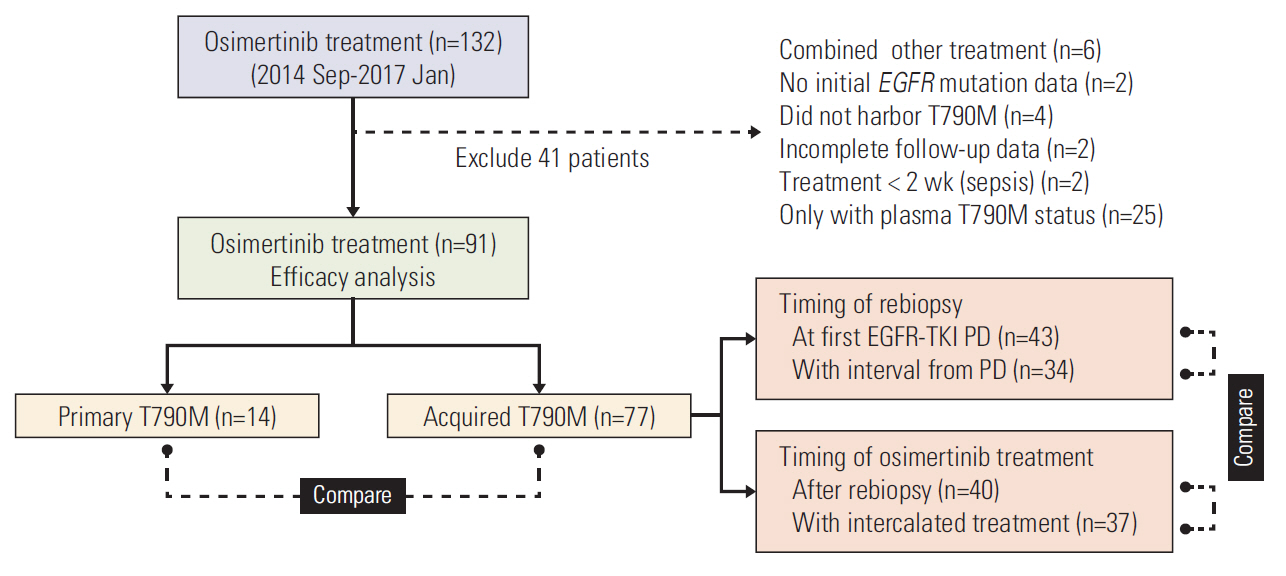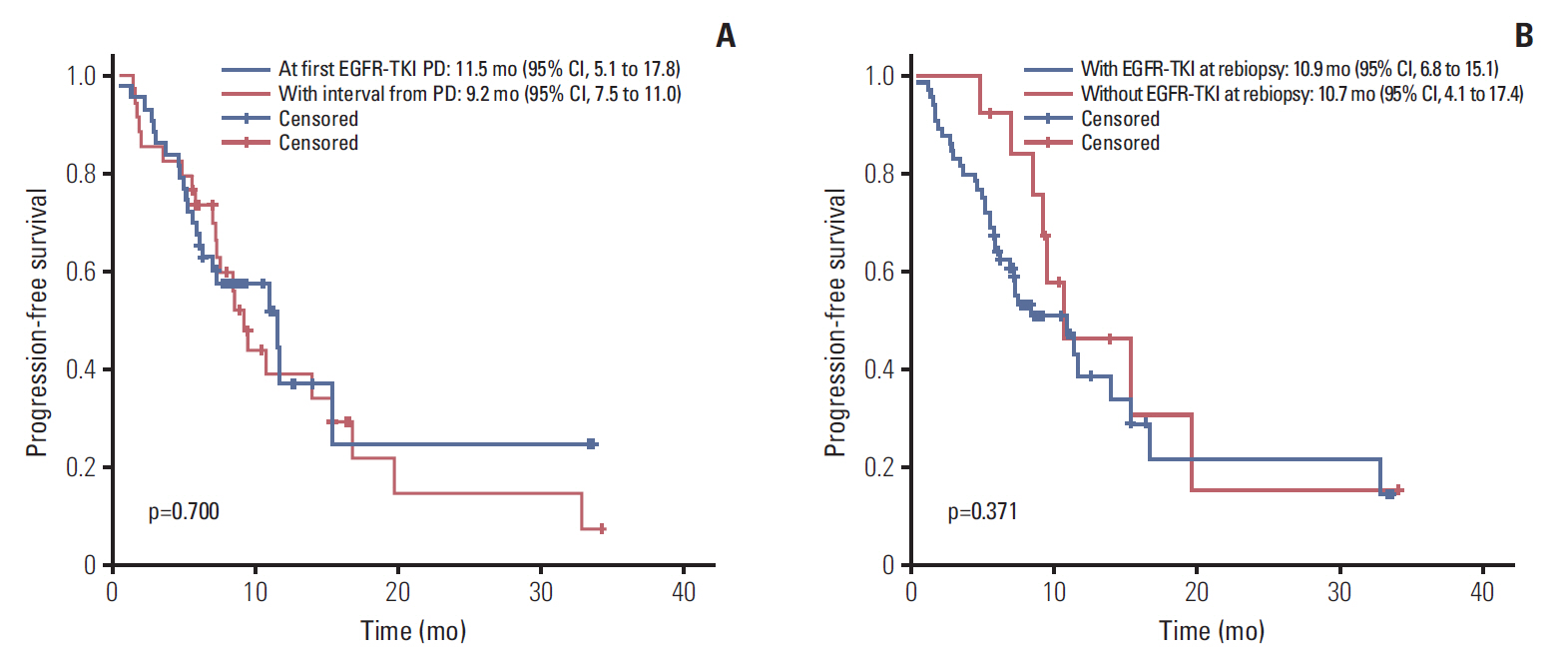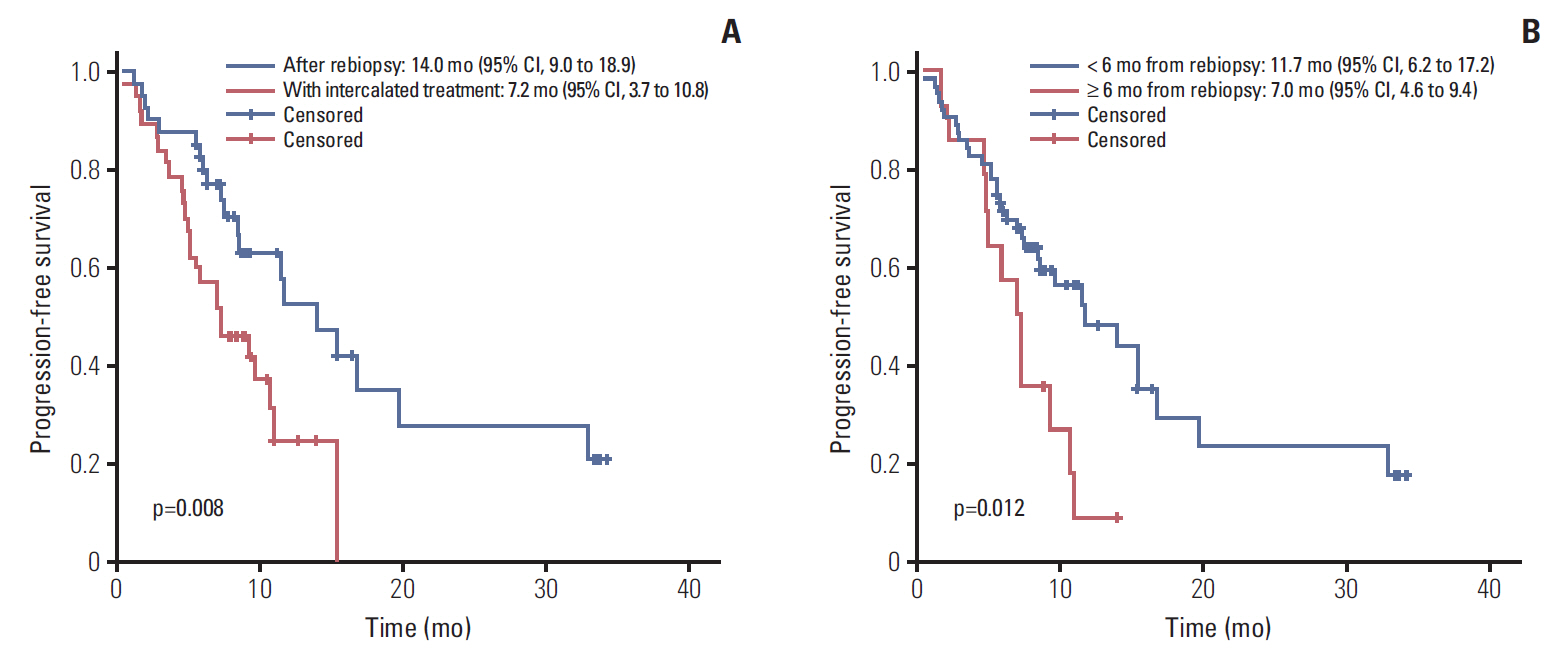Cancer Res Treat.
2018 Oct;50(4):1164-1174. 10.4143/crt.2017.460.
Intercalated Treatment Following Rebiopsy Is Associated with a Shorter Progression-Free Survival of Osimertinib Treatment
- Affiliations
-
- 1Division of Chest Medicine, Department of Internal Medicine, Taichung Veterans General Hospital, Taichung, Taiwan. august@vghtc.gov.tw
- 2Faculty of Medicine, School of Medicine, National Yang-Ming University, Taipei, Taiwan.
- 3Institute of Biomedical Sciences, National Chung Hsing University, Taichung, Taiwan.
- 4Division of Critical Care and Respiratory Therapy, Department of Internal Medicine, Taichung Veterans General Hospital, Taichung, Taiwan.
- 5Department of Clinical Laboratory Sciences and Medical Biotechnology, College of Medicine, National Taiwan University, Taipei, Taiwan.
- 6Department of Laboratory Medicine, National Taiwan University Hospital, Taipei, Taiwan.
- 7Center of Genomic Medicine, National Taiwan University College of Medicine, Taipei, Taiwan.
- 8Department of Pathology and Graduate Institute of Pathology, National Taiwan University College of Medicine, Taipei, Taiwan.
- 9Center for Optoelectronic Biomedicine, National Taiwan University College of Medicine, Taipei, Taiwan.
- 10Comprehensive Cancer Center, Taichung Veterans General Hospital, Taichung, Taiwan.
- KMID: 2424789
- DOI: http://doi.org/10.4143/crt.2017.460
Abstract
- PURPOSE
Epidermal growth factor receptor (EGFR) T790M mutation serves as an important predictor of osimertinib efficacy. However, little is known about how it works among patients with various timings of T790M emergence and treatment.
MATERIALS AND METHODS
Advanced EGFR-mutant lung adenocarcinoma patients with positive T790M mutation in tumor were retrospectively enrolled and observed to determine the outcomes of osimertinib treatment. We evaluated the association between patients' characteristics and the efficacy of osimertinib treatment, particularly with respect to the timing of T790M emergence and osimertinib prescription.
RESULTS
A total of 91 patients were enrolled, including 14 (15.4%) with primary and 77 (84.6%) with acquired T790M mutation. The objective response rate and disease controlratewere 60.9% and 85.1%, respectively. The median progression-free survival (PFS) and overall survival were 11.5 months (95% confidence interval [CI], 9.0 to 14.0) and 30.4 months (95% CI, 11.3 to 49.5), respectively. There was no significant difference in response rate and PFS between primary and acquired T790M populations. In the acquired T790M subgroup, patientswho received osimertinib after T790M had been confirmed by rebiopsy had a longer PFS than those with intercalated treatments between rebiopsy and osimertinib prescription (14.0 months [95% CI, 9.0 to 18.9] vs. 7.2 months [95% CI, 3.7 to 10.8]; adjusted hazard ratio, 0.48 [95% CI, 0.24 to 0.98; p=0.043]). Rebiopsy timing did not influence the outcome.
CONCLUSION
Osimertinib prescription with intercalated treatment following rebiopsy but not the timing of T790M emergence influenced the treatment outcome. We suggest that it is better to start osimertinib treatment once T790M mutation has been confirmed by biopsy.
MeSH Terms
Figure
Reference
-
References
1. Cancer Genome Atlas Research Network. Comprehensive molecular profiling of lung adenocarcinoma. Nature. 2014; 511:543–50.2. Hsu KH, Ho CC, Hsia TC, Tseng JS, Su KY, Wu MF, et al. Identification of five driver gene mutations in patients with treatment-naive lung adenocarcinoma in Taiwan. PLoS One. 2015; 10:e0120852.3. Greenhalgh J, Dwan K, Boland A, Bates V, Vecchio F, Dundar Y, et al. First-line treatment of advanced epidermal growth factor receptor (EGFR) mutation positive non-squamous non-small cell lung cancer. Cochrane Database Syst Rev. 2016; (5):CD010383.
Article4. Thongprasert S, Duffield E, Saijo N, Wu YL, Yang JC, Chu DT, et al. Health-related quality-of-life in a randomized phase III first-line study of gefitinib versus carboplatin/paclitaxel in clinically selected patients from Asia with advanced NSCLC (IPASS). J Thorac Oncol. 2011; 6:1872–80.
Article5. Jackman D, Pao W, Riely GJ, Engelman JA, Kris MG, Janne PA, et al. Clinical definition of acquired resistance to epidermal growth factor receptor tyrosine kinase inhibitors in non-small-cell lung cancer. J Clin Oncol. 2010; 28:357–60.
Article6. Yu HA, Arcila ME, Rekhtman N, Sima CS, Zakowski MF, Pao W, et al. Analysis of tumor specimens at the time of acquired resistance to EGFR-TKI therapy in 155 patients with EGFR-mutant lung cancers. Clin Cancer Res. 2013; 19:2240–7.
Article7. Tseng JS, Su KY, Yang TY, Chen KC, Hsu KH, Chen HY, et al. The emergence of T790M mutation in EGFR-mutant lung adenocarcinoma patients having a history of acquired resistance to EGFR-TKI: focus on rebiopsy timing and long-term existence of T790M. Oncotarget. 2016; 7:48059–69.
Article8. Hata A, Katakami N, Yoshioka H, Kaji R, Masago K, Fujita S, et al. Spatiotemporal T790M heterogeneity in individual patients with EGFR-mutant non-small-cell lung cancer after acquired resistance to EGFR-TKI. J Thorac Oncol. 2015; 10:1553–9.
Article9. Goss G, Tsai CM, Shepherd FA, Bazhenova L, Lee JS, Chang GC, et al. Osimertinib for pretreated EGFR Thr790Met-positive advanced non-small-cell lung cancer (AURA2): a multicentre, open-label, single-arm, phase 2 study. Lancet Oncol. 2016; 17:1643–52.
Article10. Janne PA, Yang JC, Kim DW, Planchard D, Ohe Y, Ramalingam SS, et al. AZD9291 in EGFR inhibitor-resistant non-small-cell lung cancer. N Engl J Med. 2015; 372:1689–99.
Article11. Yang JC, Ahn MJ, Kim DW, Ramalingam SS, Sequist LV, Su WC, et al. Osimertinib in pretreated T790M-positive advanced non-small-cell lung cancer: AURA Study phase II extension component. J Clin Oncol. 2017; 35:1288–96.
Article12. Edge SB, Byrd DR, Compton CC, Fritz AG, Greene FL, Trotti AE. AJCC cancer staging handbook. 7th ed. New York: Springer;2009.13. Eisenhauer EA, Therasse P, Bogaerts J, Schwartz LH, Sargent D, Ford R, et al. New response evaluation criteria in solid tumours: revised RECIST guideline (version 1.1). Eur J Cancer. 2009; 45:228–47.
Article14. Su KY, Chen HY, Li KC, Kuo ML, Yang JC, Chan WK, et al. Pretreatment epidermal growth factor receptor (EGFR) T790M mutation predicts shorter EGFR tyrosine kinase inhibitor response duration in patients with non-small-cell lung cancer. J Clin Oncol. 2012; 30:433–40.
Article15. Chang GC, Tseng CH, Hsu KH, Yu CJ, Yang CT, Chen KC, et al. Predictive factors for EGFR-tyrosine kinase inhibitor retreatment in patients with EGFR-mutated non-small-cell lung cancer: a multicenter retrospective SEQUENCE study. Lung Cancer. 2017; 104:58–64.16. Mok TS, Wu YL, Thongprasert S, Yang CH, Chu DT, Saijo N, et al. Gefitinib or carboplatin-paclitaxel in pulmonary adenocarcinoma. N Engl J Med. 2009; 361:947–57.
Article17. Mok TS, Wu YL, Ahn MJ, Garassino MC, Kim HR, Ramalingam SS, et al. Osimertinib or platinum-pemetrexed in EGFR T790M-positive lung cancer. N Engl J Med. 2017; 376:629–40.
Article18. Hata AN, Niederst MJ, Archibald HL, Gomez-Caraballo M, Siddiqui FM, Mulvey HE, et al. Tumor cells can follow distinct evolutionary paths to become resistant to epidermal growth factor receptor inhibition. Nat Med. 2016; 22:262–9.
Article19. Chen LY, Molina-Vila MA, Ruan SY, Su KY, Liao WY, Yu KL, et al. Coexistence of EGFR T790M mutation and common activating mutations in pretreatment non-small cell lung cancer: a systematic review and meta-analysis. Lung Cancer. 2016; 94:46–53.
Article20. Liu Y, Sun L, Xiong ZC, Sun X, Zhang SL, Ma JT, et al. Meta-analysis of the impact of de novo and acquired EGFR T790M mutations on the prognosis of patients with non-small cell lung cancer receiving EGFR-TKIs. Onco Targets Ther. 2017; 10:2267–79.21. Matsuo N, Azuma K, Sakai K, Hattori S, Kawahara A, Ishii H, et al. Association of EGFR exon 19 deletion and EGFR-TKI treatment duration with frequency of T790M mutation in EGFR-mutant lung cancer patients. Sci Rep. 2016; 6:36458.
Article22. Real world treatment study of AZD9291 for advanced/metastatic EGFR T790M mutation NSCLC (ASTRIS) [Internet]. Bethesda:, MD: ClinicalTrials.gov;2015 [cited 2017 Dec 1]. Available from: https://clinicaltrials.gov/ct2/show/NCT-02474355/.23. Maemondo M, Inoue A, Kobayashi K, Sugawara S, Oizumi S, Isobe H, et al. Gefitinib or chemotherapy for non-small-cell lung cancer with mutated EGFR. N Engl J Med. 2010; 362:2380–8.
Article24. Sugio K, Uramoto H, Onitsuka T, Mizukami M, Ichiki Y, Sugaya M, et al. Prospective phase II study of gefitinib in non-small cell lung cancer with epidermal growth factor receptor gene mutations. Lung Cancer. 2009; 64:314–8.
Article25. Shaw AT, Kim DW, Nakagawa K, Seto T, Crino L, Ahn MJ, et al. Crizotinib versus chemotherapy in advanced ALK-positive lung cancer. N Engl J Med. 2013; 368:2385–94.
Article26. Solomon BJ, Mok T, Kim DW, Wu YL, Nakagawa K, Mekhail T, et al. First-line crizotinib versus chemotherapy in ALK-positive lung cancer. N Engl J Med. 2014; 371:2167–77.
Article27. Zheng D, Ye X, Zhang MZ, Sun Y, Wang JY, Ni J, et al. Plasma EGFR T790M ctDNA status is associated with clinical outcome in advanced NSCLC patients with acquired EGFR-TKI resistance. Sci Rep. 2016; 6:20913.
Article28. Siravegna G, Marsoni S, Siena S, Bardelli A. Integrating liquid biopsies into the management of cancer. Nat Rev Clin Oncol. 2017; 14:531–48.
Article29. Oxnard GR, Thress KS, Alden RS, Lawrance R, Paweletz CP, Cantarini M, et al. Association between plasma genotyping and outcomes of treatment with osimertinib (AZD9291) in advanced non-small-cell lung cancer. J Clin Oncol. 2016; 34:3375–82.
Article30. Tseng JS, Yang TY, Tsai CR, Chen KC, Hsu KH, Tsai MH, et al. Dynamic plasma EGFR mutation status as a predictor of EGFR-TKI efficacy in patients with EGFR-mutant lung adenocarcinoma. J Thorac Oncol. 2015; 10:603–10.
Article
- Full Text Links
- Actions
-
Cited
- CITED
-
- Close
- Share
- Similar articles
-
- Real-World Analysis of the Efficacy of Rebiopsy and EGFR Mutation Test of Tissue and Plasma Samples in Drug-Resistant Non-Small Cell Lung Cancer
- Osimertinib Combined with Systemic Chemotherapy for EGFR Mutant, T790M-Negative, Non–Small Cell Lung Cancer Patients Who Develop Leptomeningeal Metastases with Extracranial Progression to Prior EGFR TKI
- Microwave ablation vs. liver resection for patients with hepatocellular carcinomas
- Assessment of Anti-tumor Efficacy of Osimertinib in Non-Small Cell Lung Cancer Patients by Liquid Biopsy Using Bronchoalveolar Lavage Fluid, Plasma, or Pleural Effusion
- Real-World Study of Osimertinib in Korean Patients with Epidermal Growth Factor Receptor T790M Mutation–Positive Non–Small Cell Lung Cancer




